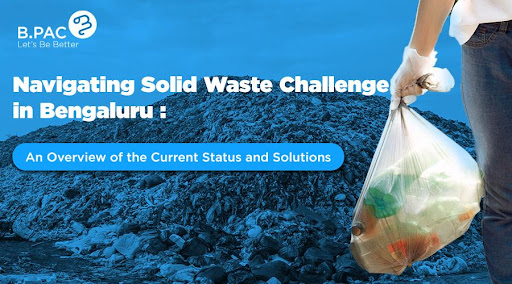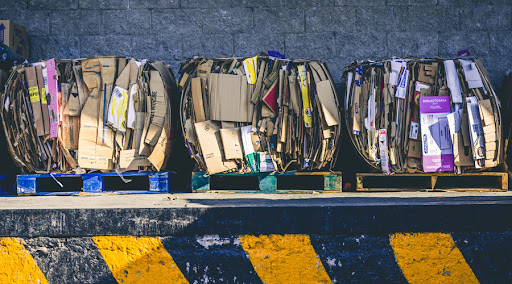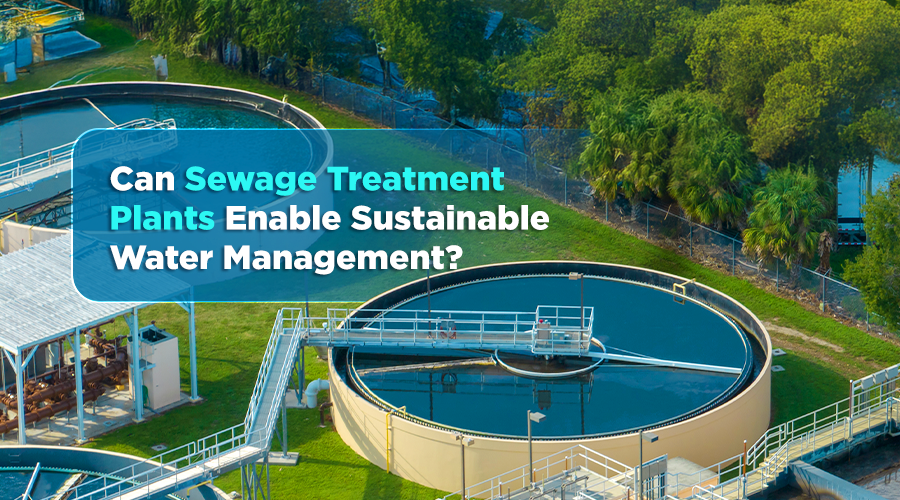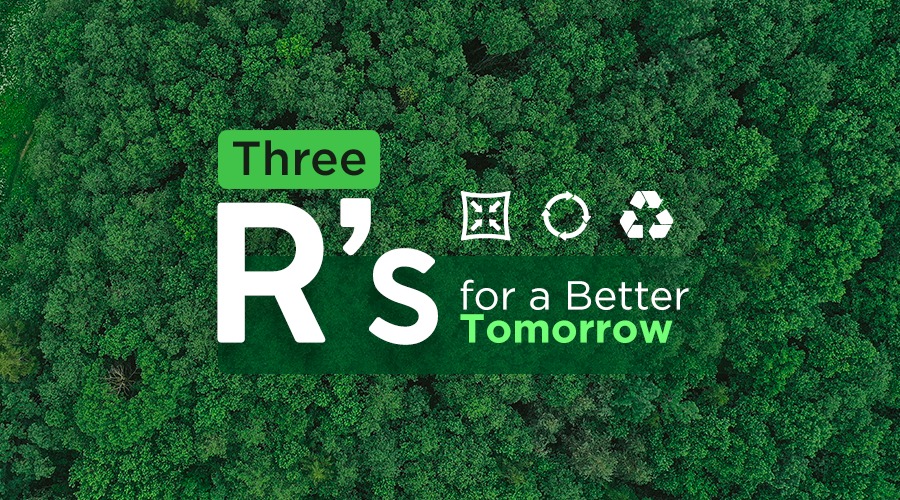An Overview of the Current Status and Solutions
Bengaluru, the capital of Karnataka, has earned a reputation as one of Asia- Pacific’s fastest-growing cities since the 1980s. Spanning across a vast metropolitan area of 1258 square kilometers, it proudly holds the distinction of being India’s fifth-largest city. However, this meteoric growth, marked by robust economic development, an ever-expanding population, and elevating living standards, has given rise to a profound challenge: the effective management of Municipal Solid Waste (MSW). In 2023, the city finds itself at a crossroads, grappling with the pressing issue of waste disposal. This article aims to provide an in-depth overview of the current state of waste management in Bengaluru and explores innovative solutions that can help address this growing concern.
Current Status of Waste Management in Bengaluru:
According to a research paper on Solid Waste Management: Current Scenario and Challenges in Bengaluru, currently, Bengaluru generates approximately 5000 metric tons of waste daily, a number that’s likely to grow in the coming years. The rate of waste generation in Bengaluru hovers within the range of 0.4 to 0.6 kilograms per capita per day, with a proposed rate at approximately 0.5 kilograms per capita daily. Despite its bustling urbanity, the city grapples with a faltering waste management system, wherein a meager 10% of the solid waste finds itself fortunate enough to undergo recycling. A lack of proper solid waste management systems has led to the development of various unauthorized dumpsites. Adding to the predicament is the city’s prevailing inadequacy in establishing scientifically sound and consistent treatment methodologies to address the diverse spectrum of waste generated by both municipal and the multifaceted industries.
 Waste quantity expected for the next decade /Source: intechnopen
Waste quantity expected for the next decade /Source: intechnopen
According to Intechnopen, in Bengaluru, BBMP handles about 30% of solid waste, and the remaining activity is outsourced. Solid waste collection is carried out in two phases: primary collection, where the solid waste is collected on auto tipper and pushcarts, and secondary collection, where the waste is transferred to landfill sites/treatment facilities through tipper lorries and compactors.
Satellite image of built up area along with dump sites in Bengaluru (2019) /Source: Science Direct
Bengaluru has developed various treatment facilities around the city. However, the city currently does not have any appropriate scientific treatment techniques for the waste generated. To usher in an era of effective solid waste management, several recommendations have been put forth. These encompass instituting source segregation practices, the establishment of dedicated wet waste processing units for composting, and the creation of segregation units and geographically targeted processing centers, with the ultimate goal of achieving a 100% processing rate for municipal solid waste. The BBMP has established decentralized processing units for dry waste. Furthermore, biomethanization plants are being set up for wet solid waste at 16 locations, out of which 8 have been made functional.[1]
Current Practises of Waste Management in Bengaluru:
Collection:
Source isolation remains a persistent challenge in Bengaluru’s waste management efforts, but there is a gradual shift towards increased awareness and progress. BBMP administers approximately 30% of Municipal Solid Waste (MSW) activities, while the remaining 70% is managed by various agencies. The entire waste collection process has undergone a significant overhaul, from primary collection to disposal. Waste sorting occurs in two stages. The initial stage involves direct collection, where waste is gathered using auto tippers and wheelbarrows. An auto tipper is allocated for every 1,000 households, while a truck is designated for every 200 families.
This massive operation employs around 20,000 pourakarmikas, who work under the BBMP and contractual agencies, involved in tasks ranging from house-to-house collection to street cleaning and MSW transportation. Household waste is first brought to common collection points, which serve as secondary areas before the waste is further transported to landfill sites or treatment facilities using tipper lorries and compactors. This multifaceted approach is aimed at improving waste management in the city and addressing the challenges posed by the diverse waste streams generated in Bengaluru.[2]
Transportation:
Efficient transportation is a vital component of waste management, ensuring that waste collected from various sources reaches its final disposal site or landfill. In the current system, waste transportation in Bengaluru utilizes a range of methods, including pushcarts and auto-rickshaws, which initially transport waste to central collection points. Subsequently, trucks are deployed to gather waste from these centers and transport it to the designated landfills.
The scale of waste generation in Bengaluru is staggering, with approximately 4,500 – 5000 tons of waste generated daily, encompassing household waste, as well as industrial, hospital, commercial, and construction waste. The city’s waste management infrastructure can effectively process about 2,100 tons of municipal waste daily, distributed among various facilities. Mavallipura landfill has a disposal capacity of 600 tons per day, Karnataka Composting Development Corporation Ltd (KCDC) can handle 300 tons per day, and Terra Firme can accommodate 1,500 tons per day. For the remaining waste, disposal sites like Bingipura and Lakhimpura are utilized. These areas, previously devoid of waste management infrastructure, have been repurposed due to their earlier use as quarry pits, now serving as sites for waste deposition and management. [2]
Source: Science Direct
Challenges in the Implementation of SWM Rules
Despite the comprehensive Solid Waste Management (SWM) rules of 2016 addressing significant issues and loopholes in waste management systems, the effective implementation of these rules faces several fundamental obstacles.
1- Limited Workforce:
Many cities lack an adequate number of staff to handle waste disposal effectively. These workers often find themselves dealing with waste management emergencies, leaving little room for long-term planning and strategic development.
2- Political Instability:
Changes in administration can result in the closure or significant alteration of ongoing waste management projects as officers and staff are reassigned. The lack of continuity can disrupt the smooth execution of solid waste management initiatives.
3- Lack of Coordination:
Insufficient planning at both the national and local levels has hindered the success of solid waste management. Projects are often handled by multiple ministries or departments without adequate coordination, leading to project failures.
4- Working Conditions:
Workers in developing countries involved in solid waste management are frequently paid inadequately and receive minimal training or personal protective equipment. This leaves them susceptible to workplace injuries and diseases. A lack of motivation and coordination with various stakeholders can exacerbate these challenges.
5- Waste Burning:
The incineration of solid waste emits harmful particles and contributes to regional air pollution. Methane gas emissions from waste deposits also have a detrimental impact on the environment, as methane is a potent greenhouse gas.
6- Financial Constraints:
Many cities struggle to allocate sufficient financial resources for the proper disposal of large quantities of solid waste. This financial burden can overwhelm municipal budgets and hinder effective waste management.
7- Technical Skill Gaps:
Limited technical expertise in equipment handling and a lack of locally adapted equipment can lead to maintenance issues and difficulties in finding replacement parts. The tropical climate often impacts equipment performance, and local governments may lack the expertise to evaluate suitable technologies for their specific circumstances.
8- Role of the Informal Sector:
The informal sector, comprising individuals and small businesses engaged in the collection and sale of recyclables, is a crucial stakeholder in waste management. Integrating this sector into formal waste programs is often challenging but essential for efficient resource recovery.
9- Limited Available Land:
As urban areas expand, available space for solid waste facilities and local collection points diminishes. High land costs and local opposition can hinder the development of new facilities. Placing waste facilities further from urban centers presents logistical challenges due to increased transportation costs and time
Solutions for Waste Management in Bengaluru
The Indian waste management market, including garbage disposal and management, is growing due to increased population and industrial activity. There’s a need for innovative solutions for waste management. Startups are coming up with innovative ideas to manage wastes and convert them into valuable resources. Moreover, the Swachh Bharat Initiative, the Indian government’s flagship program to deal with waste collection and its effective management, is expected to provide immense growth opportunities to various upcoming startups.
Another solution is the concept of a circular economy, which is gaining prominence in India. The waste management industry offers huge potential, as only 30% of the 75% recyclable waste is being recycled currently. However, there’s a shortage of proper policies for collection, disposal, and recycling, and a lack of efficient infrastructure, which are leading to poor waste management in the country.
Effective waste control measures are essential for managing the challenges posed by waste disposal. Several key strategies can help address waste management issues and promote a cleaner and more sustainable environment. Here are some solutions:
Fee-Based Waste Generation:
Charging waste generators, including households and bulk generators like hotels, shopping malls, and hospitals, based on the volume of waste they produce can serve multiple purposes. It encourages waste reduction and provides local urban authorities with an additional source of revenue.
Source Segregation:
Segregating waste at the source is a fundamental step in waste management. This practice reduces waste collection costs and allows for the proper transportation and processing of specific waste streams by recycling agencies, facilitating low-cost recycling.
Recycling and Bio-Methanation:
Biodegradable waste can be effectively processed through recycling and bio-methanation processes. When necessary, other composting techniques can also be employed to manage biodegradable waste more efficiently.
Anti-Littering Measures:
Implementing strict anti-littering regulations and imposing on-the-spot fines can deter people from littering and contribute to cleaner public spaces.
Enforcement of Regulations:
The enforcement of solid waste management regulations, such as those introduced in 2016, is crucial. Regular revisions and updates to these regulations can keep waste management practices in line with evolving needs and best practices.
Stakeholder Integration:
Waste management is most successful when various stakeholders, including local governments, major waste generators, NGOs, community groups, and academia, collaborate effectively. Integrating these stakeholders into waste management efforts ensures a holistic approach to the issue.
Community Involvement:
Raising awareness about the harmful effects of waste and involving the community in waste management for wealth creation is vital. Local governments, municipalities, non-governmental organizations, and academia can collectively drive initiatives that engage and educate the entire community in responsible waste management practices. Community participation is essential for the success of any waste management program and contributes to a cleaner and more sustainable environment.
Conclusion
Waste management in Bengaluru is a multifaceted challenge that requires a comprehensive and multi-pronged approach. It is imperative that the city and its residents come together to tackle this issue collectively. By implementing innovative solutions, enforcing regulations, and fostering a culture of responsible waste management, Bengaluru can work towards a cleaner and more sustainable future.
In 2023, Bengaluru stands at a critical juncture where the choices and actions taken in the present moment will ripple forth with far-reaching consequences, imprinting upon the city’s environment, the well-being of its citizens, and the overall quality of life. It is essential for the government, businesses, and citizens to take proactive steps to transform Bengaluru into a model city for efficient and sustainable waste management. Each small action we take, from diligently separating our recyclables from our general waste to disposing of hazardous materials responsibly, contributes to the well-being of our city. By making these thoughtful choices, we can alleviate the strain on our waste management systems, reduce environmental impacts, and ultimately create a healthier and more livable urban environment.
The success of these efforts will not only benefit the city itself but can also serve as an inspiration and benchmark for waste management practices across India and beyond.
Sources:







